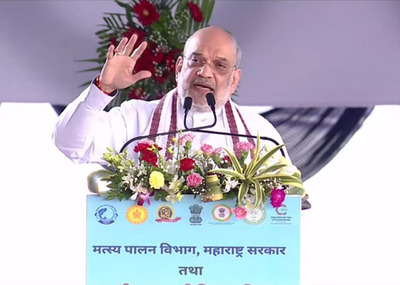Mumbai, Oct 27 (IANS) Union Home and Cooperation Minister Amit Shah on Monday stressed India’s commitment to self-reliance, sustainability and empowering cooperatives in the fisheries sector, while highlighting the significance of the distribution of deep-sea fishing vessels.
“The objective of this programme for the distribution of 'deep-sea fishing boats' is to fully utilise the potential of India's fisheries wealth in the coming times. The benefits arising from the fisheries industry should reach directly to the toiling fishermen and the poor families associated with cooperative societies -- this is the main goal of this initiative. In the next five years, we will create a system that will work for fishermen like dairy, sugar mills, and market committees, and will be the reason for their economic prosperity,” he added.
The Home Minister was speaking at the distribution of deep-sea fishing vessels under Pradhan Mantri Matsya Sampada Yojna at Mazagon Dock in the presence of Maharashtra Chief Minister Devendra Fadnavis, Deputy CMs Eknath Shinde and Ajit Pawar, Ports and Fisheries Minister Nitesh Rane, among other dignitaries. He said, "The scheme is set to bring a significant change in the lives of the sisters and brothers engaged in fisheries, working for their livelihood in our 11,099-kilometre-long coastal region. In the coming days, it will emerge as a very significant scheme."
“This is not just distribution of vessels, but this is distribution of dignity, prosperity and self-reliance to our fishermen. First time in India, deep-sea fishing vessels are owned and operated by fishermen cooperatives, not private companies. Cooperatives are the soul of Aatmanirbhar Bharat in fisheries,” said Minister Shah.
He added that in the next five years, about 200 trawler fishing boats will be prepared for those engaged in fishing, which will be operated through cooperatives.
HM Shah further stated, “Whether it is milk production, the market, or fisheries, the profit belongs to the hardworking individual, a poor person living in rural areas, and only when these poor people become economically prosperous does the country truly prosper. This is also the fundamental basis of the concept of cooperation.”
The Minister highlighted how these vessels will "empower" the fishermen like never before, shifting from traditional near-shore fishing to deep-sea operations, increasing incomes by 3-4 times through access to premium catches. He stressed that cooperatives are the backbone of this empowerment, turning small fisher groups into viable businesses. He underscored the commitment to "responsible resource management" to protect marine ecosystems, aligning with India's blue economy goals.
He pointed out that sustainable practices will ensure long-term viability, prevent overfishing, and boost exports. He called upon states to replicate Maharashtra's model, promising Central support for infrastructure like cold chains and ports. He said India will become a top global fish producer by 2030, contributing to Viksit Bharat.
According to the government release, deep-sea fishing vessels are being given to beneficiaries at a unit cost of Rs 1.2 crore with financial support from the Government of Maharashtra, the National Cooperative Development Corporation (NCDC) and the Department of Fisheries, Government of India. It marks a significant step towards modernising India’s Marine fisheries sector, enhancing deep-sea fishing capacity, and promoting cooperative-led growth in coastal regions. It aims to explore fisheries resources in the Indian Exclusive Economic Zone (EEZ) and High Seas.
India’s marine fisheries sector has traditionally operated on a modest scale, with fishermen relying on conventional vessels and techniques, typically venturing only up to 40–60 nautical miles from the coastline. This limited operational range has constrained catch volumes and economic returns. This initiative will empower fisheries cooperative societies and FFPOs to sustainably harness the vast potential of India’s Exclusive Economic Zone (EEZ) and High Seas, particularly in regions like Lakshadweep and Andaman & Nicobar Islands. It is expected to unlock new opportunities in high-value fisheries such as tuna, thereby enhancing India’s seafood exports and strengthening coastal livelihoods, said the government release.
--IANS
sj/dpb
You may also like

Visiting UAE Commander briefed on 'Operation Sindoor'

How 'old money' thinks differently? CA's financial lessons on why most Indians fail to build 'generational wealth'

Mahagathbandhan will form govt in Bihar, says Cong MP Akhilesh Prasad Singh (IANS Interview)

5 Qwen AI Photo Editing Prompts: Transform Ordinary Photos into Ultra-Realistic 3D Portraits in 8K

Andrew Cuomo 'laughs' as radio host says Zohran Mamdani would 'cheer' another 9/11; Democrats call exchange 'Islamophobic'







